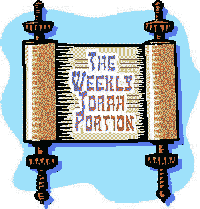Search our Archives:
» Home
» History
» Holidays
» Humor
» Places
» Thought
» Opinion & Society
» Writings
» Customs
» Misc.
|
To Do and Not to Sin
By Michael Chessen
This week's reading of BeChukotai closes the book of
Leviticus by charging us to have faith in God and to keep and diligently
study His Torah. Whereas the Jewish people had previously declared at Mt.
Sinai that "we will do and we will learn" all that God commands, this
commitment is now being translated into concrete terms, and we then behold
the possible grave consequences for straying from the Torah's path.
The faith which our patriarch Abraham demonstrated toward God
undoubtedly serves as the paradigm of perfect faith. However, in practice
we perhaps more often tend to emulate Lot, hesitating to part from material
gain even when it entails spiritual loss, and sometimes ultimately
requiring a divine "push" to steer us free of harm's way. In commanding us
to leave our fields fallow every seventh year, God presents us with a very
difficult test of faith. Whereas we will be able to see if the promised
plenty of the sixth year comes to fruition, how will we be able to
"know"(during the seventh) that there won't be severe drought in the eighth
and ninth years?
In order to strengthen us in general and to restrain us
from succumbing to the temptation to violate the land's sabbatical year in
particular, God closes Leviticus with the ominous series of warnings which
is known as "The Reproof". Just as the angels had to literally "whisk away"
Lot to safety, the Torah's reproof works to divinely ensure that we don't
let our own "rational" understanding of things lead us to any kind of
"reasoned" violation of God's will.
Lest anyone infer that the threat implied by the reproof passage
allows for the prospect of "passively" being forced to follow the Torah,
the opening section of BeChukotai very clearly details both the expected
rewards for active observance as well as the negative consequences of
passive non-observance. God promises us peace and prosperity for following
His laws and being careful to keep His commandments (Leviticus 42:3),
meaning, that we are to first act, and then to learn. The Torah would not
have us waiting in some form of a "to be or not to be" state of limbo for
perfect understanding of the commandments as a prerequisite to our
observing them. Rather, we are to follow Abraham's "leap of faith" and
first act as commanded, retroactively gaining insight and understanding of
our observance through our subsequent study.
It is fascinating to observe, however, that the condition which causes
us to potentially embark on the spiritual descent which ultimately brings
on God's severe punishments is not first failing to follow His laws, but
first failing to listen to Him, i.e., desisting from the study of God's
Torah. This intriguing inversion of Sinai's pledge could be interpreted by
saying that whereas action is the prerequisite to good, knowledge is the
safeguard from bad. As we once again approach the holiday of Shavuot, the
celebration of the giving of the Torah, may we strive for both more timely
observance as well as a more learned adherence to the Torah's prescribed
precepts.
Wishing you all a Shabbat Shalom !

|
|
Please let us know if you see something unsavory on the Google Ads and we will have them removed. Email us with the offensive URL (www.something.com)
|





|
